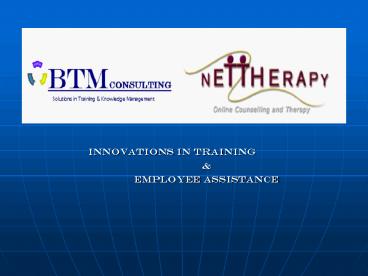Innovations in Training - PowerPoint PPT Presentation
1 / 23
Title:
Innovations in Training
Description:
Regular incident and personal progress reports ... Personal management support to assist in employee relations ... Two Levels of training. Personal ... – PowerPoint PPT presentation
Number of Views:36
Avg rating:3.0/5.0
Title: Innovations in Training
1
- Innovations in Training
- Employee Assistance
2
Critical Incident
- Is any event which has a stressful impact
sufficient enough to overwhelm the usually
effective coping skills of either an individual
or group. They are typically sudden, powerful
events which are outside the range of ordinary
human experiences.
3
Critical time periods
- The initial day of the incident
- Up to 3 days following the incident
- 1 week after the incident
- 1 month after the incident
4
Who is affected
- Primary victim
- Secondary victims
- Family
- Friends
- Fellow workers
- Support staff Management
5
Organizational
Individual
Improved Job - person fit Pre-employment
induction training Stress management and
Training Critical Incident management policy
officer
Time Management Maintenance of Physiological
Health Maintenance of Psychological
Health Personal Stress management Strategies
Proactive
Relaxation Response Meditation Bio feedback and
desensitization Behaviour Modification Escape
alcohol, drugs Counselling
Critical Incident counselling and
debriefing Relocation
Reactive
6
NETTHERAPY BTM Solutions at your finger tips
Critical incident management
Online / live counselling Therapy
Workplace Education Training
7
The Cycle of Support workplace well being
Information from TNA forms the basis of education
training programs. These programs prepare
individuals and organizations to cope with
critical incidents.
Individual organizational preparedness limits
the impact of critical incidents on employees
and productivity.
Counselling, the information gathering process
that forms the basis of TNA and provides support
to impacted employees
8
Critical Incident Management
- Professional debriefing (group personal)
- Personal stress and trauma management
- Work within operational guidelines and protocols
(WHS) - Regular incident and personal progress reports
- Ongoing support via the internet to accelerate
recovery - Personal management support to assist in employee
relations
9
Online / live counselling and support
- Therapeutic psychological support
- Reinforces prior education and training during
and after C I T - Gathers information on staff capacities and
recovery - Provides feedback for improving workplace
procedures processes - Acts to minimise managerial stress
responsibility during and after C I T
10
Workplace Education Training
- Preventative education designed to prepare staff
for critical incidents - Communication, mediation stress management
- Training needs analysis
- Maintains learning organisation strategies
- Organisational knowledge management
- Organisation Content specific
11
This means a healthy return on time and money
invested through
- Less down time / absenteeism
- Increased motivation hence productivity
- More stable workplace
- Happier working environment
- Increased employee confidence/self esteem
- Increased employee loyalty
- Improved job security satisfaction
12
So where does it all begin?
13
Workplace Education and Training
- Prevention preparedness minimises impact
- Develops a supportive work environment
- Creates a learning organisation
14
Two Levels of training
- Personal
- Organizational Management and Critical Incident
Officer training
15
Anyone who has been or is likely to be involved
with a Critical Incident the associated Trauma
- Staff
- Family members of staff
- Management
16
Personal Stress Management
- Physiology of Stress
- Fight or flight
- Chemical reactions
- Autonomic reactions
- Physical reactions
- Physical disorders pain
17
Personal Stress Management
- Behavioural patterns of stress
- Depression
- Moods swings
- Atypical behaviour
- Hypochondriasis
- Helplessness
18
Personal Stress Management
- Cognitive processing and stress
- Thought patterns
- Regression
- Perception and reality
19
Personal Stress Management
- Techniques in Stress management
- Relaxation
- Guided Fantasies (detachment)
- Cognitive reprogramming
20
Organisational Stress Management
- 6 stages of stress management
- Emotional behavioural stabilisation
- Trauma education
- Stress management
- Trauma focus
- Relapse prevention
- Follow-up maintenance
21
Critical Incident Officer training
- Counselling theory and practice
- Debriefing techniques
- Psychotraumatology
- Defusing
22
Live / online counselling and therapy
- Providing staff with an opportunity to receive
help and support - Taking advantage of existing support for
management
23
Its in your hands































